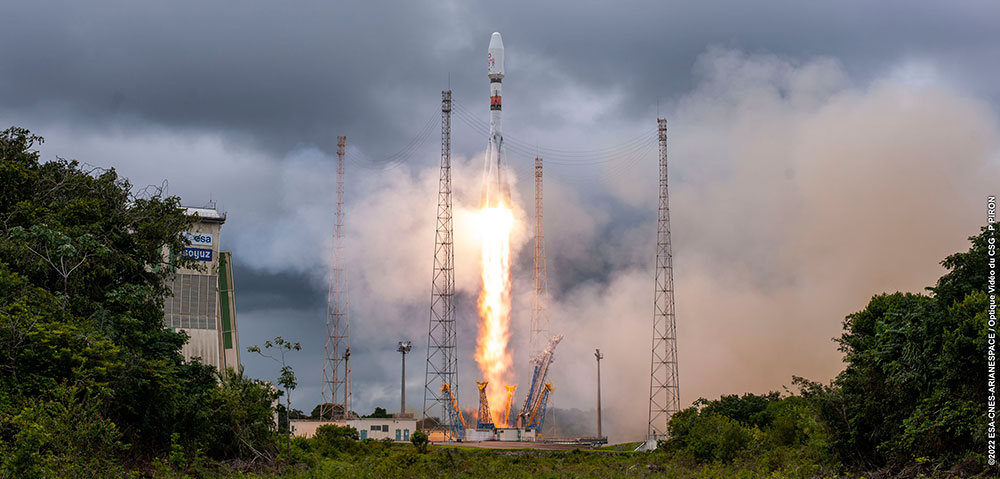Russia halts Soyuz rocket launches from French Guiana over European sanctions on Ukraine invasion
The announcement stalls Soyuz launches from French Guiana with European launch provider Arianespace

The Russian space agency Roscosmos is stopping all Soyuz rocket launches from Europe's spaceport in French Guiana due to European Union sanctions on Russia's invasion of Ukraine.
"In response to EU sanctions against our enterprises, Roscosmos is suspending cooperation with European partners in organizing space launches from the Kourou cosmodrome and withdrawing its personnel, including the consolidated launch crew, from French Guiana," Roscosmos chief Dmitry Rogozin said in a Twitter statement on Saturday (Feb. 26) according to a translation from Russian.
Russia is also recalling 87 Russian workers from Europe's South American spaceport in French Guiana who support Soyuz rocket launches for Roscosmos and the Russian companies NPO Lavochkin a, Progress RCC and TsENKI, according to a second Twitter statement from Roscosmos.
"The issue of the departure of Russian employees is being worked out," Roscosmos wrote. Russia's moves come as European Union nations, the United States and other countries have levied severe economic sanctions on Russia following the country's invasion of Ukraine on Thursday (Feb. 24).
Related: Russian space chief says US sanctions could 'destroy' International Space Station partnership
Russia's Soyuz rockets are used by the European launch provider Arianespace to launch satellites from the Guiana Space Center near Kourou, French Guiana, as well as from the Baikonur Cosmodrome in Kazakhstan (where Russia regularly launches its own Soyuz missions). The most recent Soyuz rocket to launch from Guiana Space Center lifted off on Feb. 10 carrying 34 OneWeb internet satellites.
Arianespace, based in France, also uses its own European Ariane 5 heavy-lift rocket and Vega rocket for smaller launches from French Guiana.
Get the Space.com Newsletter
Breaking space news, the latest updates on rocket launches, skywatching events and more!
Arianespace's next Soyuz launch was scheduled for early April to launch two Galileo navigation satellites into orbit for the European Union's Galileo constellation. That mission will almost certainly be delayed due to Russia's announcement on Saturday.
Thierry Breton, the European Commissioner for Space, said Russia's decision to halt Soyuz launches with Europe will not interrupt any services for users of the Galileo satellites or of the E.U.'s Copernicus Earth observation satellite program.
"I confirm that this decision has no consequences on the continuity and quality of the Galileo and Copernicus services," Breton said in the statement. "Nor does this decision put the continued development of these infrastructures at risk."
Breton added that the E.U. and its member states are "ready to act decisively" in order to "protect these critical infrastructures in case of aggression," and that it will "continue to develop Ariane 6 and Vega C to ensure Europe's strategic autonomy in the area of launchers."
The Ariane 6 rocket is Europe's successor to the Ariane 5 and is expected to make its first flight sometime later in 2022. The Vega C rocket is a follow-on to Europe's Vega rocket that is designed to reach more orbits and carry more diverse payloads for the same cost. The European Space Agency and Arianespace are working to develop the Ariane 6 and Vega-C rockets.
On Friday (Feb. 25), ESA Director-General Josef Aschbacher said in a statement that the European space officials were "closely monitoring what's happening" in Ukraine while weighing any response. ESA is working closely with Russia's space program to launch the European ExoMars rover mission to Mars later this year.
In addition to calling off Soyuz launches from French Guiana, Rogozin also announced Saturday that he no longer felt a joint Russian-U.S. collaboration on Russia's planned Venera-D mission to Venus was necessary, given the ongoing sanctions.
In a separate statement, Rogozin wrote that he found it "inappropriate" for any continued participation of the U.S. in the Russian Venus mission, which was slated to launch sometime in the 2020s. NASA scientists began talks with Russia to participate in the Venera-D mission in 2017.
Email Tariq Malik at tmalik@space.com or follow him @tariqjmalik. Follow us @Spacedotcom, Facebook and Instagram.
Join our Space Forums to keep talking space on the latest missions, night sky and more! And if you have a news tip, correction or comment, let us know at: community@space.com.

Tariq is the Editor-in-Chief of Space.com and joined the team in 2001, first as an intern and staff writer, and later as an editor. He covers human spaceflight, exploration and space science, as well as skywatching and entertainment. He became Space.com's Managing Editor in 2009 and Editor-in-Chief in 2019. Before joining Space.com, Tariq was a staff reporter for The Los Angeles Times covering education and city beats in La Habra, Fullerton and Huntington Beach. In October 2022, Tariq received the Harry Kolcum Award for excellence in space reporting from the National Space Club Florida Committee. He is also an Eagle Scout (yes, he has the Space Exploration merit badge) and went to Space Camp four times as a kid and a fifth time as an adult. He has journalism degrees from the University of Southern California and New York University. You can find Tariq at Space.com and as the co-host to the This Week In Space podcast with space historian Rod Pyle on the TWiT network. To see his latest project, you can follow Tariq on Twitter @tariqjmalik.









